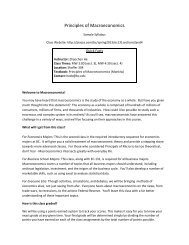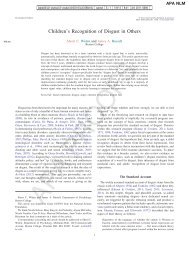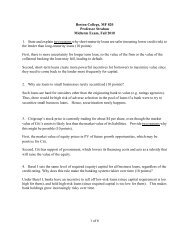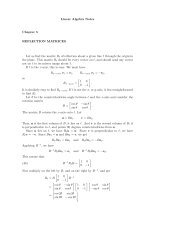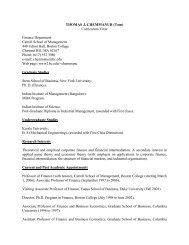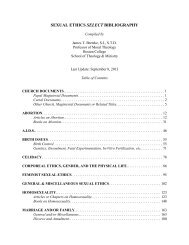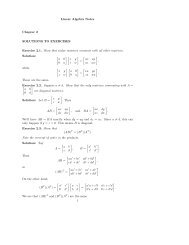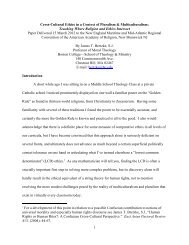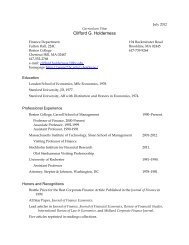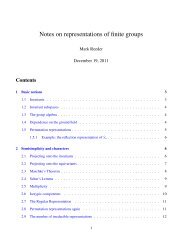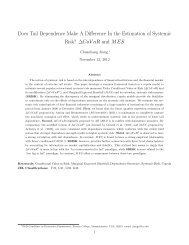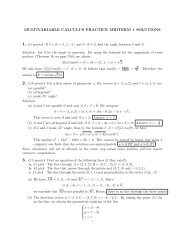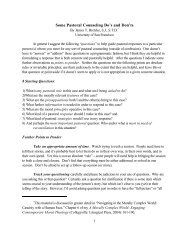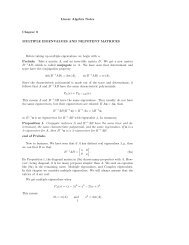DANIELLE HEDEGARD - Boston College
DANIELLE HEDEGARD - Boston College
DANIELLE HEDEGARD - Boston College
Create successful ePaper yourself
Turn your PDF publications into a flip-book with our unique Google optimized e-Paper software.
MANUSCRIPTS UNDER REVIEW AND IN PROGRESS<br />
Book Project<br />
In Progress, Consuming Capoeira: Blackness and Cosmopolitan Tourism in Salvador, Brazil<br />
Articles Under Review<br />
Hedegard, Danielle. “The Meanings of Symbols: Cultural Frames and Semiotic Relationships<br />
of Race in the Tourism Market of Salvador da Bahia, Brazil,” Under review at Cultural<br />
Sociology.<br />
Working Papers<br />
Hedegard, Danielle. “Global Connections and Cultured Disposition: Framing Culture for<br />
Brazilian Elites.”<br />
This manuscript integrates work on cultural taste with work on globalization. Content<br />
analysis of culture magazines oriented toward Brazilian elites reveals that elite culture in<br />
Brazil integrates elements of global culture – popular and highbrow objects from the United<br />
States and Western European– with popular themes from Brazilian culture. Articles frame<br />
elite culture as demonstrating transnational connections and a cultured disposition that relies<br />
on prior knowledge of foreign culture and places.<br />
Hedegard, Danielle. “The Strength of Weak Racial Identity: How Social Networks vary across<br />
Strong vs. Symbolic Identities.”<br />
This manuscript theorizes racial identity as a symbolic resource that varies in strength at<br />
the individual level, and then integrates this framework with scholarly work on race and<br />
social networks. Regression techniques on data from the General Social Survey reveal that<br />
weak racial identities are “strong” symbolic resources similar to recent findings on the<br />
strength of weak culture. They act as flexible symbolic tools that allow actors to establish<br />
diverse weak social ties and large networks. Including a measure of identity strength in<br />
regression models also weakens the effect of racial status on both number of weak ties and<br />
overall network size. For whites, a weaker identity increases weak ties, but for blacks, it<br />
decreases weak ties. This unexpected finding provides a possible mechanism for the<br />
difference in network size between whites and blacks documented by network scholars.<br />
Work in Development<br />
“Cultural Tastes and Consumption Patterns in Brazil”<br />
NSF proposal, anticipated future book project. Draft available.<br />
“Success and Failure in a Cultural Market: How Class Habitus Sells Race.”<br />
Adaptation of dissertation findings.<br />
“Culture in Cross-‐Cultural Interaction”<br />
Uses a case study of an AmeriCorps workgroup to theorize how actors with divergent collective<br />
representations co-‐construct meaning.<br />
“Can the Upwardly Mobile Working Class Learn Cultural Capital?”<br />
This project will contribute to work on cultural capital, by asking if and how actors can acquire<br />
dominant cultural capital later in life.<br />
Hedegard 2



